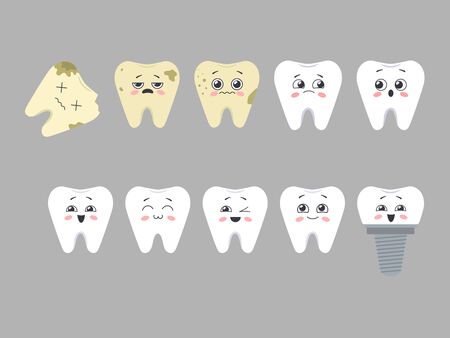Introduction to Mini Dental Implants and Full Implants
When it comes to replacing missing teeth, dental implants are one of the most effective and long-lasting solutions available. However, not all dental implants are the same. There are two main types: mini dental implants and full implants. Understanding their differences can help you decide which option is best for your needs.
What Are Mini Dental Implants?
Mini dental implants (MDIs) are a smaller version of traditional dental implants. They are typically less than 3mm in diameter and have a one-piece design that includes both the post and the abutment. Because of their size, MDIs are often used when there is limited bone density or space in the jaw.
What Are Full Implants?
Full dental implants, also known as traditional or standard implants, are larger and usually range from 3mm to 6mm in diameter. They consist of multiple parts: a titanium post that is surgically placed into the jawbone, an abutment that connects to the post, and a crown or prosthetic tooth that sits on top. These implants provide strong support for single crowns, bridges, or even full dentures.
Key Differences Between Mini and Full Implants
To better understand how these two types of implants compare, heres a quick breakdown:
| Feature | Mini Dental Implants | Full Dental Implants |
|---|---|---|
| Size | Smaller (less than 3mm in diameter) | Larger (3mm to 6mm in diameter) |
| Structure | One-piece design with a built-in abutment | Multi-piece system with separate components |
| Surgical Procedure | Less invasive, can often be placed in a single visit | Requires multiple visits and healing time before final restoration |
| Bone Density Requirement | Suits patients with lower bone density without needing grafting | Requires sufficient bone density; may need bone grafting |
| Main Use | Stabilizing dentures or replacing small teeth | Replacing individual teeth, bridges, or supporting full dentures |
| Longevity & Strength | Durable but may not last as long as full implants under heavy pressure | Extremely durable and designed for long-term use |
| Cost | Tends to be more affordable due to simpler placement process | Higher cost due to surgical complexity and durability |
Which One Is Right for You?
The choice between mini dental implants and full implants depends on several factors, including your oral health, bone structure, budget, and personal preferences. If youre looking for a less invasive solution or have limited bone density, mini dental implants might be a suitable option. On the other hand, if youre seeking a long-term, highly durable solution for missing teeth, full implants could be the better choice.
In the following sections, we will explore the advantages and disadvantages of each type of implant in more detail.
2. Pros and Cons of Mini Dental Implants
Mini dental implants (MDIs) have become a popular alternative to traditional full-sized implants, especially for patients who need a less invasive and more affordable solution. However, like any dental procedure, they come with both advantages and disadvantages. Below is a breakdown of the pros and cons to help you determine if MDIs are the right choice for you.
Pros of Mini Dental Implants
Mini dental implants offer several benefits that make them an attractive option for many patients.
Less Invasive Procedure
One of the biggest advantages of MDIs is that the procedure is far less invasive than traditional implants. Since they are smaller in size, the placement requires minimal surgery, often without the need for bone grafting. This means:
- Shorter healing time
- Less discomfort during and after the procedure
- Fewer complications related to surgery
More Affordable Than Full Implants
The cost of mini dental implants is generally lower than traditional implants, making them a budget-friendly option for those looking to restore their smile without breaking the bank.
Quick Recovery Time
Since the procedure is minimally invasive, most patients experience a faster recovery period. Many people can return to normal activities within a day or two.
A Good Option for Patients With Bone Loss
If you’ve experienced bone loss in your jaw and don’t want to go through a bone grafting procedure, MDIs may be a suitable solution since they require less bone density for placement.
Cons of Mini Dental Implants
While MDIs have several advantages, there are also some drawbacks to consider before making a decision.
Limited Durability Compared to Full Implants
Mini dental implants are not as durable as traditional implants due to their smaller size. This means they may not withstand heavy biting forces as well as full-sized implants.
Not Suitable for All Cases
If you need to replace multiple missing teeth or require significant bite strength, mini implants may not provide enough support. They are best suited for small tooth replacements or stabilizing dentures.
Potential for Long-Term Wear and Tear
The smaller diameter of MDIs makes them more prone to wear over time, which could mean they might not last as long as traditional implants.
| Pros | Cons |
|---|---|
| Less invasive procedure | Limited durability compared to full implants |
| No need for bone grafting in many cases | Might not be suitable for replacing multiple teeth |
| More affordable than traditional implants | Potential for long-term wear and tear |
| Faster healing time | Might not withstand heavy chewing forces |
| A good option for patients with bone loss |

3. Pros and Cons of Full Dental Implants
Full dental implants are a popular and long-term solution for missing teeth. They offer many benefits, but the procedure is more complex compared to mini dental implants. Let’s break down the pros and cons to help you understand if they are the right choice for you.
Pros of Full Dental Implants
- Long-Lasting Durability: Full implants are designed to last for decades with proper care, making them a great long-term investment.
- Strong and Stable: These implants fuse with the jawbone, providing excellent stability for chewing and speaking.
- Natural Appearance: Full implants look and feel like natural teeth, enhancing both function and aesthetics.
- Prevents Bone Loss: Since they integrate with the jawbone, they help prevent bone deterioration that can occur when teeth are missing.
Cons of Full Dental Implants
- Surgical Complexity: The procedure requires multiple visits, including surgery, healing time, and placement of the crown.
- Higher Cost: Full implants tend to be more expensive than mini dental implants due to the materials used and surgical requirements.
- Longer Recovery Time: Patients often need months for their jawbone to heal before completing the implant process.
- Not Suitable for Everyone: Those with significant bone loss may require additional procedures like bone grafting before getting full implants.
Comparison Table: Mini Dental Implants vs. Full Implants
| Mini Dental Implants | Full Dental Implants | |
|---|---|---|
| Surgical Procedure | Less invasive, faster recovery | More complex, longer healing time |
| Lifespan | Around 10 years | Potentially lasts a lifetime |
| Bite Strength | Lighter support for smaller restorations | Strong and stable for full chewing ability |
| Candidacy | A good option for those with less bone density | Might require bone grafting in some cases |
| Total Cost | Tends to be more affordable | A higher upfront cost but long-term value |
If you’re looking for a durable and natural-looking tooth replacement, full dental implants could be an excellent choice. However, it’s essential to consider factors such as cost, recovery time, and overall oral health before making a decision.
4. Cost and Accessibility Considerations
When deciding between mini dental implants and full implants, cost and accessibility play a significant role. Understanding the financial aspect and insurance coverage can help patients make an informed decision that fits their budget.
Cost Comparison
The cost of dental implants varies based on several factors, including the type of implant, the complexity of the procedure, and the dentist’s expertise. Generally, mini dental implants are more affordable than full implants due to their smaller size and less invasive procedure.
| Type of Implant | Average Cost per Implant | Total Procedure Cost |
|---|---|---|
| Mini Dental Implants | $500 – $1,500 | $2,000 – $5,000 (depending on number of implants) |
| Full Dental Implants | $1,500 – $4,000 | $10,000 – $30,000 (for full-mouth restoration) |
Insurance Coverage
Dental insurance coverage for implants varies widely. Many insurance plans classify dental implants as a cosmetic procedure, meaning they may not be fully covered. However, some policies offer partial coverage for necessary procedures.
- Mini Implants: Some insurance providers may cover a portion of mini implants if they are deemed medically necessary.
- Full Implants: Traditional implants may have slightly better insurance coverage if they are required for functional reasons.
Accessibility and Convenience
The time commitment and recovery process also impact accessibility. Mini implants require fewer visits and have a shorter healing period, making them more convenient for many patients.
| Treatment Time | Surgical Complexity | Recovery Period | |
|---|---|---|---|
| Mini Dental Implants | A few hours to one day | Lesser complexity; often completed in one visit | A few days to a week |
| Full Dental Implants | A few months (including healing time) | Surgical placement requires multiple visits | A few months for full recovery |
If cost and convenience are top priorities, mini dental implants may be a better option. However, if long-term durability is more important, full dental implants could be worth the higher investment.
5. Which Option Is Right for You?
Deciding between mini dental implants and full implants depends on several factors, including your bone density, oral health, lifestyle, and personal preferences. Below, we break down the key considerations to help you make an informed choice.
Bone Density and Jaw Structure
If you have significant bone loss or low bone density, mini dental implants may be a better option because they require less bone support. Full implants, on the other hand, often require a strong jawbone foundation and may involve bone grafting if there’s insufficient bone.
Oral Health Considerations
Your overall oral health plays a big role in determining which implant is right for you. If you have gum disease or other dental issues, full implants may require additional treatments before placement. Mini implants typically have a simpler procedure with fewer requirements.
Lifestyle and Daily Habits
Your daily activities and habits can influence your decision:
| Factor | Mini Dental Implants | Full Implants |
|---|---|---|
| Time Commitment | Faster procedure and recovery | Longer process with healing time |
| Durability | Less durable, but still effective | Stronger and more long-lasting |
| Comfort | Easier adjustment period | Takes time to fully integrate |
| Cost | More affordable | Higher cost due to complexity |
Personal Preferences and Budget
Your comfort level with dental procedures and budget are important factors. If you want a quick and cost-effective solution, mini implants might be ideal. However, if youre looking for a long-term investment with maximum stability, full implants could be the better choice.
Consulting with a Dental Professional
The best way to determine the right option for you is to consult with a dentist. They will assess your oral health, discuss your needs, and recommend the most suitable implant type based on your individual situation.


